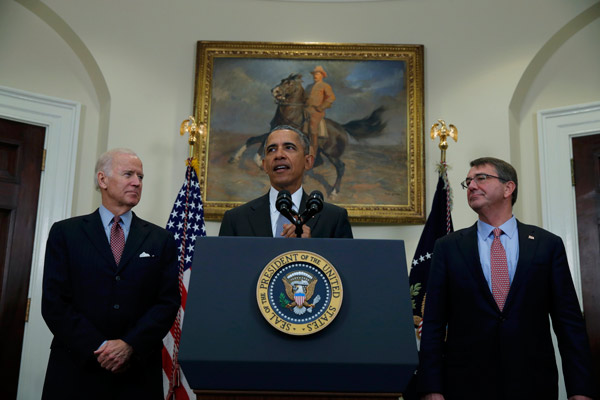Obama makes last attempt to persuade Congress to close Guantanamo
(Agencies) Updated: 2016-02-24 10:01
The president, a Democrat, pressed the Republican-led legislature to give his proposal a "fair hearing" and said he did not want to pass the issue to his successor in January.
The Pentagon-authored plan proposes 13 potential sites on US soil to hold some 30-60 detainees in maximum-security prisons but does not identify the facilities.
US law bars transfers to the United States, and lawmakers are unlikely to lift those restrictions, especially in an election year.
"We'll review President Obama's plan," Republican Senate Majority Leader Mitch McConnell said. "But since it includes bringing dangerous terrorists to facilities in US communities, he should know that the bipartisan will of Congress has already been expressed against that proposal."
Paul Ryan, the Republican speaker of the House of Representatives, said Obama had yet to convince Americans that moving the prisoners to the United States was smart or safe.
Obama is considering taking executive action to close the facility, situated in a US naval station in southeast Cuba, if Congress does not change its position. The White House declined to rule out a unilateral option on Tuesday.
Republicans oppose any executive order, and issuing one would almost certainly generate legal challenges.
The Guantanamo prisoners were rounded up overseas when the United States became embroiled in wars in Iraq and Afghanistan following the Sept 11, 2001, attacks on New York and Washington. The facility came to symbolize aggressive detention practices that opened the United States to accusations of torture. Most detainees have been held without trial for more than a decade.
"Let us go ahead and close this chapter," Obama said at the White House. "I don't want to pass this problem on to the next president, whoever it is. And if, as a nation, we don't deal with this now, when will we deal with it?"
Obama pledged as a presidential candidate in 2008 to close Guantanamo. Doing so would fulfill that pledge and boost his legacy during his final year in office. Pressing his case now thrust the issue into the 2016 presidential campaign.
"Not only are we not going to close Guantanamo - when I am president, if we capture a terrorist alive, they are ... going to Guantanamo and we are going to find out everything they know," said Republican presidential candidate Marco Rubio.







